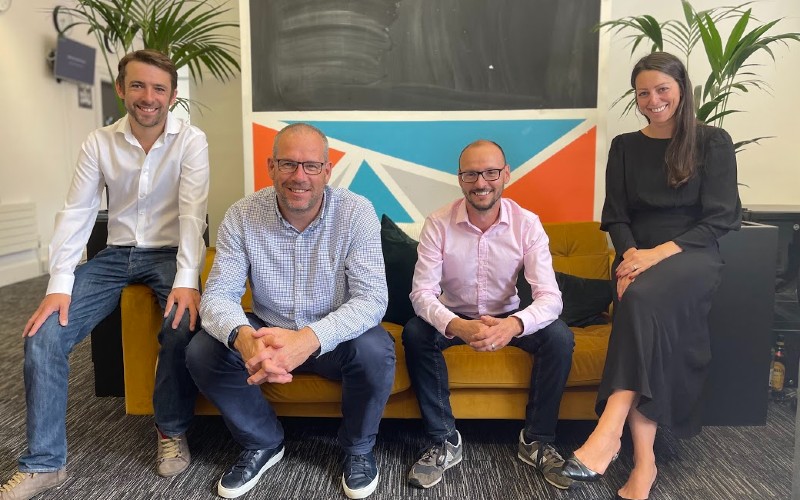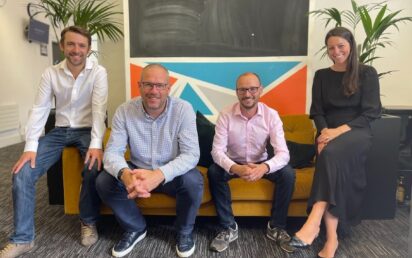Many a startup has pointed to the winning of a flagship contract as pivotal to securing long-term success.
But how would you feel if that flagship customer was your very first? And you weren’t entirely confident you could deliver the contract?
“We were a little bit ‘rabbit in the headlights’,” admits David Clee, CEO of MirrorWeb, a data archiving business. “We were very apprehensive that we were about to bid on a seven-figure, central government contract… with a service that kind of worked.”
Clee and his co-founders Phil Clegg, now CTO, and Karl Stringer, the firm’s chief data officer, would ultimately win and deliver the contract with the help of key figures at tech giant AWS. But that was a world away from where the business started – above a pub in Manchester.
IT consultant Clee had the original idea of creating a web archiving technology which would copy a small business’s website and flick the traffic across to this ‘mirror image’ site in the event that the main site ever went down.
“It only cost $10 a month – and we had three customers,” recounts Clee. “We couldn’t really find product-market fit.”
The first breakthrough came during a chance meeting in a pub with a figure from Legal & General, which was looking for a system capable of archiving the web and social media activity for its general insurance business.
“We presented it to the head of digital in Birmingham and they loved it. It then went to procurement… and the door was very quickly slammed in our face,” says Clee. “They wanted to see our last three years’ accounts, to speak to our top five customers.
“The fact that we were three guys working part-time above a pub on Great Ancoats Street didn’t fill them with much confidence that we could build a system to deliver the service they wanted.”
Similar responses from Ikano Bank and the Bank of Ireland followed. “We thought that was the end of MirrorWeb… then in early 2016, I came across a potential contract opportunity with the UK National Archives.”
This central government department was building an archive of every website, social media post and YouTube video ever published by the government. “We decided, rather ambitiously – having no customers, no office and no staff – to bid on this tender. And then the stars kind of fell into alignment.”
Another chance meeting – this time between Clegg and AWS’ head of public sector for Europe at a conference in London – saw MirrorWeb offered unlimited support for its bid from the Amazon cloud unit.
In Clee’s words: “The idea of moving the National Archive from on-premise into its cloud really appealed to AWS. They made us sign an NDA then revealed that they were about to open their first data centre in London – and having the UK National Archives as one of the first large datasets housed there was actually something that AWS really wanted to do.
“So suddenly a team of three became a team of six, with three solutions architects from AWS… they lent us some of their senior guys to help us write the bid.”
The contact was to take on 150 terabytes of data – 20,000 websites plus every YouTube and social media post for 20 years. “We really were taking a bit of a risk in telling them that we had a product that could do all that.
“But the AWS support gave us weight and credibility: when we met the National Archives, it turned out that AWS was their preferred supplier. So all of a sudden, we were in pole position for this ridiculous contract.”
The shockwaves sent out by the EU referendum result delayed the decision by several months. Once secured, it was for six years and worth several million pounds – and contracts with UK parliament, UN, EU, BBC and other organisations soon followed.
As the snowball grew bigger – financial services companies including Zurich, AXA and Aberdeen Standard were signed up, as well as an archive of EU legal documents at the moment the UK left – Clee says they had to professionalise further.
“When we were 10 staff, [now COO] Harriet [Christie] came on board as an account manager. That’s when we needed to grow up a bit – we needed somebody to talk to our clients who had experience of being an account manager rather than techies trying to deal with commercial people.
“We went out for a round of investment – a million pounds from the Northern Powerhouse Investment Fund, through Maven – and got ourselves a chairman in Andy McEwen, a veteran of Oracle and Fujitsu who also built CRM business Epiphany. His experience and guidance is really important to us.”
Since the start of COVID-19, MirrorWeb has raised a further £2m from Maven and grown from 20 customers to 150 thanks to its first foray into outbound marketing – the result of a “very receptive” market in financial services in the US.
Now employing 54 staff and adding 30-40 customers a month, it is planning to launch fully in the US with an office in Austin, Texas by the end of the first quarter in 2022.
“We’re looking to add probably another 25 heads by Q1 next year,” adds Clee.

